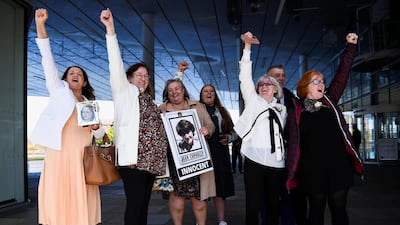Ten people killed in a 1971 British Army operation in Belfast were innocent, an inquest set up to examine one of the bloodiest days in Northern Ireland’s three decades of unrest found on Tuesday.
The inquest, which began in November 2018, examined the deaths in the Ballymurphy area of west Belfast.
The shootings occurred during the era known as the Troubles, when armed troops patrolled streets of the British-ruled province riven by sectarian conflict.
The victims included a Catholic priest and a mother-of-eight who served tea to soldiers. Irish Foreign Minister Simon Coveney said on Tuesday it was “one of the most tragic days” of the conflict.
The coroner, Judge Siobhan Keegan, found nine of the 10 victims were killed by British soldiers. The court did not definitively say who shot the 10th victim.
She delivered her findings to applause from families of the victims shortly after the UK government announced it would introduce legislation to give greater protection to former soldiers who served in Northern Ireland.
“All of the deceased were entirely innocent of any wrongdoing on the day in question,” she said.
Briege Voyle, whose mother Joan Connolly was among the victims, said the finding confirmed what she already knew.
“Now the world knows – my mummy was an innocent woman – she wasn’t a gunwoman,” she said outside court.
John Teggart, whose father Daniel was shot 14 times, said he was overjoyed with the ruling.
“My father can rest in peace knowing he’s an innocent man. That means a lot to me,” he said.
The deaths over a three-day period of disorder in Ballymurphy, a housing estate, in a Catholic-majority area, occurred in the days after the introduction of internment in the province. The policy involved the arrest and detention of paramilitary suspects without trial.
Father Hugh Mullan, the 38-year-old priest who died, was helping an injured man and waving a white object before he was shot twice in the back, the inquiry found.
The coroner said there was not enough evidence to say who shot the 10th victim, John James McKerr.
Judge Keegan said it was “shocking” that the state did not carry out a proper investigation into the killing.
Questions also remain unanswered about the identity of the soldiers who shot many of the victims, the judge added.
No one has been charged or convicted in connection with any of the killings. The inquest was a fact-finding exercise and not a criminal trial.
About 3,600 people were killed in the sectarian confrontation between Irish nationalist militants, pro-British loyalist paramilitaries and Britain’s military that largely came to an end after a 1998 peace agreement.

